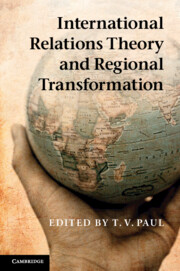Book contents
- Frontmatter
- Contents
- Figures and tables
- About the contributors
- Acknowledgments
- Part 1 Introduction
- 1 Regional transformation in international relations
- 2 How regions were made, and the legacies for world politics
- Part 2 Realist perspectives
- Part 3 Liberal perspectives
- Part 4 Constructivist perspectives
- Part 5 Eclectic perspectives
- Part 6 Conclusions
- Index
- References
1 - Regional transformation in international relations
Published online by Cambridge University Press: 05 June 2012
- Frontmatter
- Contents
- Figures and tables
- About the contributors
- Acknowledgments
- Part 1 Introduction
- 1 Regional transformation in international relations
- 2 How regions were made, and the legacies for world politics
- Part 2 Realist perspectives
- Part 3 Liberal perspectives
- Part 4 Constructivist perspectives
- Part 5 Eclectic perspectives
- Part 6 Conclusions
- Index
- References
Summary
Regional transformation has emerged as a major topic of research during the past few decades. The transition of Western Europe into a pluralistic security community and the limited but meaningful efforts at security-community-building in Southeast Asia and the Southern Cone of Latin America have contributed to this upsurge in scholarly interest. With the end of the Cold War, the proper understanding of regional conflict and cooperation patterns assumed wider significance. Today, conflicts and the spillovers they produce in regions such as the Middle East and South Asia are acknowledged as being of paramount concern to international security. International Relations (IR) theory has made much progress in explaining change in regions. Yet, these often remain as “islands of theories” and it is time to take stock in order to see if connections can be made among them to obtain a comprehensive understanding of regional transformation.
From a practical standpoint what is significant here is the failure of many regions and subregions to transform into peaceful communities after the end of the Cold War. Moreover, in some regions the earlier trend toward greater cooperation and peaceful order has not been progressing all that well, following the initial enthusiasm of the post-Cold War years. Knowing when and how a region transforms into sustained peaceful order or the opposite – a conflictual order – is of utmost importance for crafting appropriate policy initiatives. This is all the more crucial given the intensity of conflicts in the regions of enduring rivalries, some of which are nuclearized, and their significance to the larger international order. Is regional transformation a linear process or is it possible to achieve a semblance of order only to return to disorder at different points in time? It is also significant to understand how and why some regions remain characterized by perpetual conflict or enduring rivalries despite efforts at resolution from within and outside.
- Type
- Chapter
- Information
- Publisher: Cambridge University PressPrint publication year: 2012
References
- 25
- Cited by



